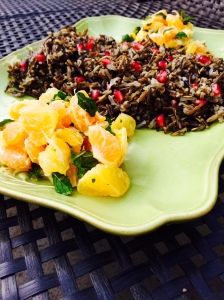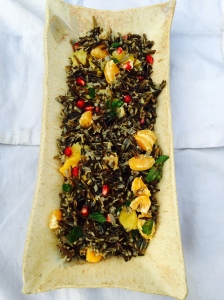In Vayetzei, we read that Jacob leaves Beer-sheva at sunset to travel to Laban’s house. Jacob is at Laban’s house for 20 years, during which time he faces many challenges and uncertainties that shroud his life in darkness. After the 20 years there, he leaves Laban’s house at sunrise.
The Etz Hayim commentary describes “the 20 years at Laban’s house as a ‘dark night for the soul,’ years spent struggling with the dark forces represented by Laban’s treachery and Jacob’s confronting his own attracting to deceit” (p. 166).
However, despite the challenges and darkness that Jacob deals with in the 20 years, he also connects with God. Etz Hayim continues, “when the Sages attribute to Jacob the institution of the evening prayer (Ma’ariv), they may be crediting him as the first person able to find God in the midst of darkness” (p. 166)
Jacob’s time of darkness was an opportunity for him to find God. And, as Yael Shy comments, “Jacob leaves us with the challenge of recognizing our encounters with God in all God’s forms.” There are many dark and challenging parts of our lives and society. Our food system is one. How is it possible that the wealthiest nation in the world has 45.3 million citizens living in poverty and 49.1 million hungry people? In addition, for 29 million Americans who live in low-income areas, the nearest supermarket is more than a mile away. When someone is poor, without transportation and/or living in a low-income area without a supermarket, it significantly hampers one’s ability to eat nutritious food. Despite, this dark aspect of our society, there are countless individuals who recognize this challenge and are re-imagining our food system.
Rabbi Brad Artson writes in The Bedside Torah, about the “power of imagination” in Vayetzei. He writes that, “through the power of imagination, each of us retains the ability to transform the world. . . . Our religion trains us to visualize a better world. . . .[and] as with Jacob, our imagination can provide the necessary first step toward transforming our world and ourselves” (p. 47-48).
Many Americans are envisioning and transforming our food systems to ensures that poverty and hunger are eliminated and that all people have regular access to nutritious foods.
One such person is Karyn Moskowitz of New Roots in Louisville, KY. She’s featured in Faith in Food: Changing the World One Meal at a Time, a fabulous new book by Susie Weldon and Sue Campbell that shares inspiring, exciting stories of global food activists who, guided by their faith, are re-imagining their food systems Karyn’s organization runs “Fresh Stops” which works with residents who are low-income and live in neighborhoods without access to fresh produce. Through New Roots, residents pool their money and SNAP (food stamps) benefits to bulk purchase fresh produce from local farms. Without this program, participants would not be eating these healthful foods.
The recipe I created this week symbolizes Jacob’s journey from sunset to sunrise, with darkness in the middle of his journey. The dish is anchored on both ends by a citrus mixture, symbolizing sunset/sunrise and black wild rice in the center to represent darkness. The pomegranate seeds mixed with the rice are a reference to God’s recognition of Jacob’s hard work tending to Laban’s ” streaked, speckled and mottled flock.” After presenting on a platter, to symbolize the journey, one can then blend everything together in a bowl to enjoy.
Wild Rice, Citrus, Pomegranate Dish
Ingredients
2 Valencia oranges, chopped
2 Mandarin oranges, chopped
1 cup black wild rice
1/2 Pomegranate seeds
1 handful mint, chopped
olive oil
salt
Preparation
1. Cook rice over medium heat until done.
2. Chop oranges into small pieces. Finely chop mint and blend with oranges.
3. When rice is done, fold in seeds, drizzle with olive oil and add a pinch of salt. Place in center of platter and citrus mixture on each end.
4. After serving, blend ingredients together.
B’tayavon!






Sarah,
You create suspense. Every week as I study the Parsha I think what will Sarah write this week and what will the recipe be ? The lentil stew was tasty. For Chayei Sarah I could not find yellow beets ( your markets are so varied and abundant) so I used rutabaga. I am sure your recipe was better. I will try this black rice but may have to use canned mandarin oranges.
I am collecting all your recipes. Have you thought about making them into a book ?
Keep surfing on food and faith !
Take care,
MAN
LikeLiked by 1 person
So glad you are enjoying the posts and the recipes 🙂
LikeLike
It is so impressive that you are able to come up with such creative recipes that are related to the week’s ‘parasha’, are in line with sustainable food ethics that are frequently missing in our industrial food culture and still taste so good. I’ve tried several of your recipes and they are delicious and refreshing. They are also deeply rooted in tradition and faith. Thank you Sarah!
LikeLike
Thank you so much and so glad you are enjoying the recipes 🙂
LikeLike
HI Sarah.
I love all of the background you write about which makes making the recipes even more fun and interesting.
This is terrific!
Thanks.
Marian
LikeLiked by 1 person